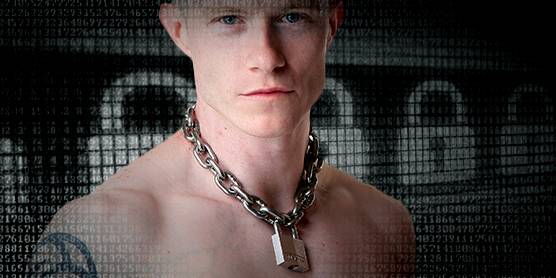MEMBER ARTICLE: Watch out for the shadows

from
Recon News
13 February 2018
By Recon member LondonSubNigel
A year or so ago, I wrote about passwords, and how important it is to keep them safe, and to use a different one for each site you use [Editor – See link below]. It's not just about protecting your privacy, but about protecting the privacy of other members too.
As kinky people, we should always remember that not everyone is able to be - or wants to be - completely open about what they get up to. Would you suddenly want everyone you work with, for example, to know about your fondness of fisting? Or for you aunt to discover that you're really into bondage? It's nothing to be ashamed of, but it can make for some awkward conversations over dinner, or in the break room.
Unfortunately, as big social media companies like Facebook try and work their way further and further into our lives, they build up lots of information about us, in ways we might not even realised. And some of that is down to what's known as "shadow profiles."
Your [shadow profile] on Facebook isn't something you can see - it's what the company knows about you, from information it's discovered elsewhere. It's used to provide things like the lists of people you might know - and to suggest to other people that they might want to become friends with you.
This is how, for example, patients of a psychotherapist in the USA were suggested as friends to each other, even though they had nothing else in common. Because all the patients had the same person's contact number in their phone books, Facebook made the connection between them, and suggested they become friends - even though they weren't friends with the therapist online.
Facebook, of course, isn't the only site to do this sort of thing, though it's sheer size means that it does more than others. Many other social sites pull similar tricks, often under the guide of "helping you to find people to connect with." Their app might ask permission to read the contacts on your phone, or their website might offer to help you find people, if you just give them the details of your email account.
Once you've done that, you have no control over how information is used - in fact, if someone else uploads your phone number to Facebook as part of their contacts, they treat it as information belonging to the person who uploaded it, not to you.
Sites like Recon, based in the EU, operate under much stricter rules, and can't get away with this sort of thing; new rules being introduced this year - called GDPR - are even stronger. Facebook has to comply with EU rules for accounts created there, but not for others. That's why, for example, photos uploaded by US members can have faces recognised automatically, while it's not done for EU or Canadian accounts, where the rules are stronger.
You might, perhaps, think that sharing a little bit of information about someone else isn't a problem. But it's another way in which people's private lives can be unintentionally exposed, and I think we owe it to our fellow kinky people to be as careful their personal information as we are with our own.
Even if you've tried very hard to avoid giving Facebook your own phone number, if someone else you know on the site has it in their phone, it can be linked to your profile. The contact details they have stored might include other information too - perhaps they stored your surname as "Fisting" or "Leather," or included your Recon nickname. All of that information can end up indexed and stored in Facebook's shadow profile, or in the data that LinkedIn, or some other site is storing about its users.
It's possible for someone to find you on Facebook with just your phone number - a feature that can't be turned off completely, though it can be restricted just to Friends, via the site's Privacy settings.
Regardless of whether or not you've given your number to the site, people who have your phone number in their contacts are more likely to be suggested to each other as 'people you may know.' That likelihood may increase if there are other common bits of information.
That's sounds really useful when it means that all your friends can easily connect. It's less good if, say, a teenage nephew creates their new profile, and because they too have your phone number, and allowed Facebook to rummage through their contacts, Facebook offers them a selection of your kinky friends that perhaps they might like to know.
How can you help stop this? Well, there are limits to what you can do, but a good rule of thumb is to never let any site or social app have access to contacts on your phone, or via your email.
Yes, it might make it a bit harder to find some of the people you want to connect with, but it's also simply polite. If you wouldn't give someone's private phone number to anyone who asked for it, without checking first, why would you hand it over to big companies like Facebook or LinkedIn?
As I said when I wrote about passwords, this isn't always just about you, or me. When we share information about other people, we might be having a big impact on their privacy. So, think carefully next time an app or website makes a seemingly innocent request for access to your contacts.
SHARE

